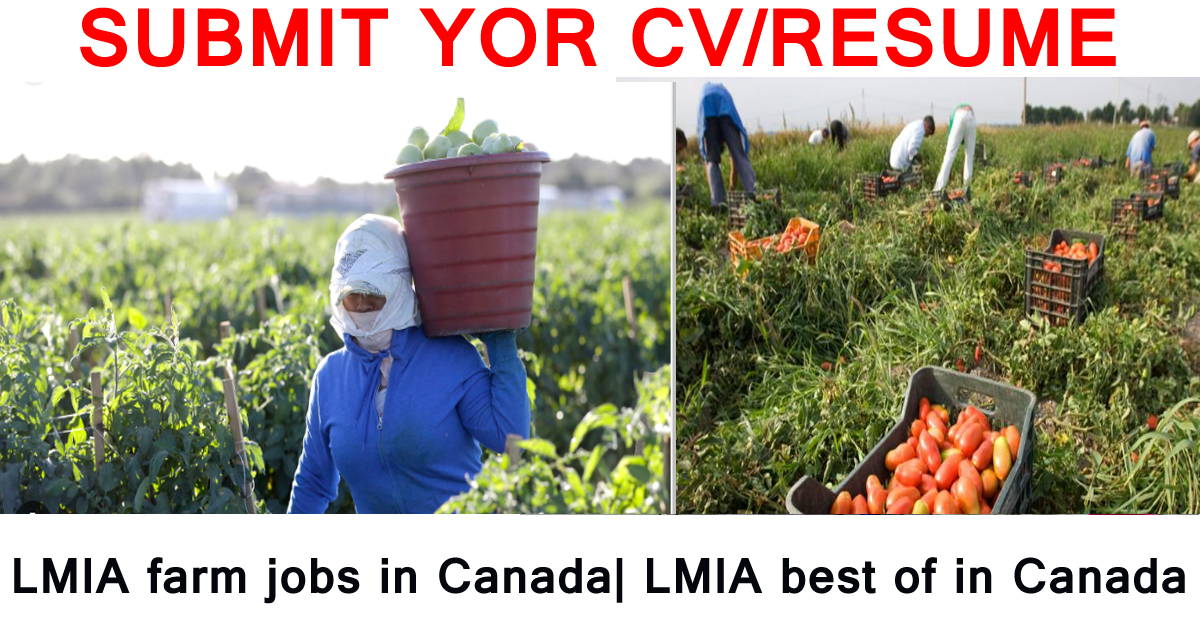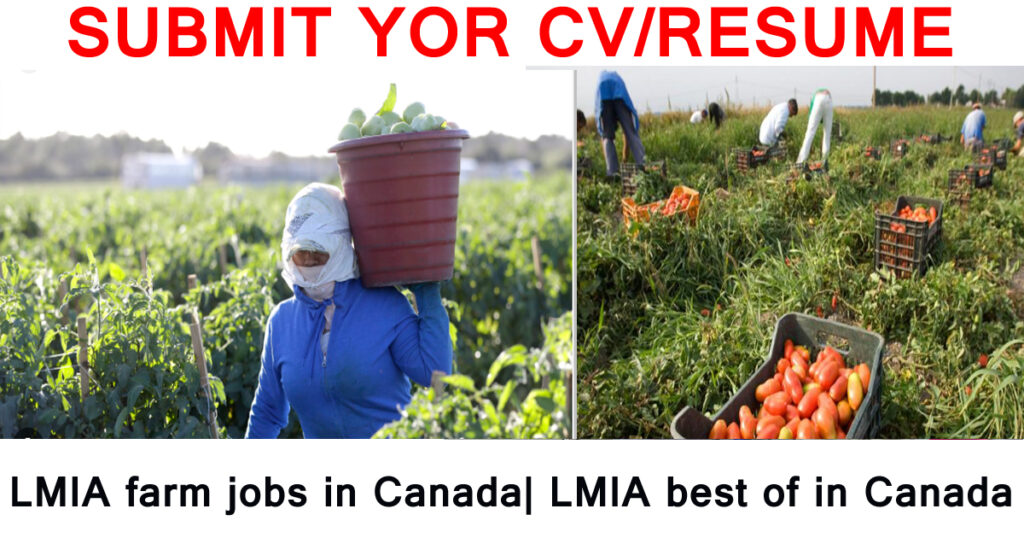
LMIA (Labour Market Impact Assessment) LMIA farm jobs in Canada| LMIA best of in Canada is a process in Canada that assesses the impact of hiring foreign workers on the Canadian job market.
Table of Contents
It is a critical step for Canadian employers who wish to hire foreign workers under the Temporary Foreign Worker Program (TFWP). The LMIA process ensures that hiring foreign workers does not negatively affect the job opportunities and wages of Canadian citizens and permanent residents.

What is LMIA and its significance in Canada?
The LMIA process involves the employer applying for an assessment from Employment and Social Development Canada (ESDC), which evaluates the job offer and determines if there are no qualified Canadians available to fill the position.
| Job title | Farm workers |
| Location | Canada |
| Job type | Full-Time, Part-Time, Temporary, Permanent, Seasonal |
| Education | High School, Diploma, Degree in Relevant Category |
| No of vacancy | 1000+ |
| Salary | Specified with Job Title |
If the assessment is positive, the employer can proceed with hiring foreign workers through the TFWP. A positive LMIA is often a requirement for foreign nationals to obtain a work permit in Canada.
LMIA farm jobs and their importance in the agriculture industry
LMIA farm jobs play a crucial role in sustaining and supporting the agricultural industry in Canada. The agriculture sector heavily relies on temporary foreign workers to fill labor shortages, especially during peak seasons when additional manpower is required for planting, harvesting, and processing agricultural products.
Foreign workers who are hired through the LMIA process contribute to the growth and development of the agricultural sector in Canada. They bring valuable skills, expertise, and knowledge that help enhance productivity and efficiency.
ALSO APPLY: Factory worker jobs in Canada with visa sponsorship
Additionally, LMIA farm jobs also provide opportunities for foreign workers to gain valuable work experience and support their families back home.
By facilitating the hiring of foreign workers through the LMIA process, the Canadian government ensures the continued success and sustainability of the agriculture industry, while simultaneously promoting economic growth and benefiting both employers and workers alike.
For more information on LMIA and its significance in Canada, you can visit the official website of Employment and Social Development Canada (ESDC).
II. LMIA Farm Jobs in Canada
Different types of LMIA farm jobs available.
There are various types of farm jobs available in Canada that require a Labour Market Impact Assessment (LMIA) for foreign workers. These jobs include:
- Crop Farm Worker: This job involves planting, cultivating, and harvesting crops such as fruits, vegetables, grains, and flowers.
- Livestock Farm Worker: This job involves taking care of animals on a farm, such as cows, pigs, chickens, and sheep.
- Dairy Farm Worker: This job involves milking cows, feeding animals, and maintaining the cleanliness of the dairy farm.
- Poultry Farm Worker: This job involves taking care of poultry, including chickens, turkeys, ducks, and geese.
- Greenhouse Worker: This job involves growing and maintaining plants in a controlled environment, such as a greenhouse.
Requirements and qualifications for LMIA farm jobs.
To be eligible for LMIA farm jobs in Canada, applicants must meet certain requirements and qualifications, including:
- Physical fitness: Farm work can be physically demanding, so applicants should be in good physical health.
- Experience: Some farm jobs may require previous experience in the same or a similar role.
- Specific skills: Certain farm jobs may require specific skills, such as operating farm equipment or caring for livestock.
- Language proficiency: Applicants should have a basic understanding of English or French, as it will be necessary to communicate and follow instructions on the farm.
Benefits and challenges of working in LMIA farm jobs.
Working in LMIA farm jobs in Canada can offer both benefits and challenges. Some of the benefits include:
- Opportunity to gain valuable work experience.
- Competitive wages and benefits.
- Chance to live and work in a beautiful rural setting.
- Potential for career growth and advancement in the agricultural industry.
However, there are also some challenges to consider, such as:
- Physical labor and long working hours.
- Exposure to various weather conditions.
- Separation from family and friends, as some farm jobs may be located in remote areas.
It’s important for applicants to carefully weigh the benefits and challenges before deciding to pursue LMIA farm jobs in Canada.
III. Popular LMIA Farm Jobs in Canada
Crop Farmers: Roles and responsibilities, skills required
Crop farmers play a crucial role in Canada’s agricultural industry by growing crops that contribute to the country’s economy. Here are some key responsibilities and skills required for crop farmers:
Roles and responsibilities:
- Planting, cultivating, and harvesting crops such as grains, fruits, vegetables, and oilseeds.
- Monitoring and managing crop health, including pest and disease control.
- Operating and maintaining farm machinery and equipment.
- Keeping records of crop production and managing farm finances.
- Adhering to safety and environmental regulations in farming practices.
Skills required:
- Knowledge of crop production techniques, including seed selection, planting methods, and crop rotation.
- Ability to operate and maintain farm machinery and equipment.
- Problem-solving and decision-making skills to address crop health issues and make informed management decisions.
- Strong physical stamina and ability to work in various weather conditions.
- Basic understanding of financial management to track expenses and revenue.
Livestock Farmers: Roles and responsibilities, skills required
Livestock farmers are responsible for raising and caring for animals for various purposes, such as meat production, dairy farming, and breeding. Here are some key responsibilities and skills required for livestock farmers:
ALSO APPLY: Urgent! Fruit picking jobs in Canada for foreigners Apply Now
Roles and responsibilities:
- Managing the health and well-being of livestock, including feeding, housing, and disease control.
- Breeding and reproductive management of animals.
- Monitoring and maintaining herd or flock records.
- Operating and maintaining farm structures and equipment for livestock management.
- Ensuring compliance with animal welfare regulations and standards.
Skills required:
- Understanding of animal behavior and basic veterinary care.
- Knowledge of livestock feeding and nutrition requirements.
- Ability to handle and restrain animals safely.
- Strong physical stamina and willingness to work with animals in various weather conditions.
- Problem-solving skills to address livestock health issues and make informed management decisions.
Farm Workers: Roles and responsibilities, skills required
Farm workers provide essential support to farmers, assisting with various farming tasks to ensure smooth farm operations. Here are some key responsibilities and skills required for farm workers:
Roles and responsibilities:
- Assisting with planting, cultivating, and harvesting crops.
- Feeding and caring for livestock.
- Operating and maintaining farm machinery and equipment.
- Cleaning and maintaining farm buildings and structures.
- Following safety regulations and protocols in farm operations.
Skills required:
- Physical strength and stamina for manual labor tasks.
- Ability to follow instructions and work as part of a team.
- Basic knowledge of farm machinery operation and maintenance.
- Willingness to work in various weather conditions.
- Attention to detail and the ability to carry out tasks efficiently.
These are some of the popular farm jobs available in Canada through the Labor Market Impact Assessment (LMIA) program. Each role requires specific skills and responsibilities, making them vital for the country’s agricultural industry.
IV. How to Apply for LMIA Farm Jobs in Canada
The process of finding and applying for LMIA farm jobs.
Applying for LMIA (Labour Market Impact Assessment) farm jobs in Canada involves several steps. Here is a breakdown of the process:
1. Research and Find Suitable Farm Job Opportunities:
- Look for farms and agricultural businesses in Canada that are hiring farm workers.
- Visit agricultural job websites, online job boards, and farm-specific job portals to explore available positions.
- Read job descriptions and requirements carefully to ensure you meet the qualifications.
2. Prepare Your Resume and Cover Letter:
- Tailor your resume and cover letter to highlight your relevant skills and experience in farm work.
- Clearly state your interest in farm work in Canada and why you are a suitable candidate.
- Emphasize any certifications or training you have related to agriculture and farming.
3. Apply for LMIA Farm Jobs:
- Follow the application instructions provided by the farm or agricultural business.
- Submit your resume and cover letter along with any required documents.
- Ensure you provide accurate contact information so employers can reach you if interested.
Tips for a successful LMIA farm job application.
To increase your chances of securing an LMIA farm job in Canada, consider the following tips:
1. Gain Relevant Experience:
- If you have limited experience in farm work, consider volunteering or interning at local farms to gain hands-on experience.
- Highlight any relevant experience you have on your resume and cover letter.
2. Obtain Necessary Certifications:
- Certain farm jobs may require specific certifications or training, such as pesticide handling or animal care.
- Research the requirements for the specific farm job you are interested in and obtain the necessary certifications if applicable.
3. Be Flexible and Open to Different Locations:
- Farm jobs are available in various regions of Canada, so be open to relocating if necessary.
- Consider both rural and urban farming opportunities, as there may be a range of job options.
4. Stay Updated on Job Postings:
- Regularly check job websites and portals for new farm job postings.
- Sign up for email alerts on job websites to receive notifications about new farm job opportunities.
5. Network and Make Connections:
- Attend agricultural job fairs and events to meet farm owners and industry professionals.
- Join farm-related associations or organizations to expand your network and learn about job opportunities.
Remember, each farm job application process may vary, so it’s essential to follow the instructions provided by the farm or agricultural business. Good luck with your LMIA farm job application!
FAQ:
Here are some frequently asked questions related to LMIA farm jobs in Canada:
How long does it take to get a positive LMIA?
he processing time for an LMIA application can vary depending on various factors, including the specific job position, location, and the processing capacity of the government. It is advisable to start the application process well in advance to allow for any potential delays.
Can LMIA farm jobs lead to permanent residency in Canada?
es, LMIA farm jobs can potentially lead to permanent residency in Canada. Through various immigration pathways, such as the Canadian Experience Class (CEC) or the Provincial Nominee Program (PNP), individuals with Canadian work experience in the agricultural sector can apply for permanent residency.
Are there any language requirements for LMIA farm jobs?
The language requirements for LMIA farm jobs can vary depending on the specific job and employer. Some positions may require proficiency in English or French, while others may have more flexible language requirements. It is important to check the specific job posting for any language requirements.
Where can I find more information about LMIA farm jobs in Canada?
For more information about LMIA farm jobs in Canada, it is recommended to visit the official website of the Government of Canada or consult with an immigration lawyer or consultant who specializes in agricultural work permits and immigration.
Additionally, the Canadian agricultural industry associations and job boards can provide valuable information and job postings in the sector.
LMIA farm jobs in Canada offer a unique opportunity to work in a thriving industry and experience the beauty and diversity of Canada’s agricultural landscapes. With the right qualifications and an approved LMIA, individuals can embark on a rewarding career in the Canadian farming sector.
| Farm supervisor | Farm worker fruit Pitt | Apply Here |
| farm workers | Langley (Bc) | Apply Here |
| Farm supervisor | Armstrong (BC) | Apply Here |
| Farm supervisor | Abbotsford(bc) | Apply Here |
| Farm supervisor | Surrey (BC) | Apply Here |
| Farm supervisor | kelowna (BC) | Apply Here |
| Farm supervisor | Aldergrove(BC) | Apply Here |
| Farmworker fruit Pitt | meadows (BC) | Apply Here |
| Farm supervisor | Mill bay (BC) | Apply Here |
| Farm hand | Barrhead(AB) | Apply Here |
Conclusion
In conclusion, pursuing a farm job in Canada through the Labour Market Impact Assessment (LMIA) program can be a great opportunity for individuals looking to gain experience in the agricultural industry and explore the beautiful landscapes of Canada. With the demand for skilled workers in the farming sector, there are various job openings available for both temporary and permanent positions. By obtaining a positive LMIA, candidates can apply for a work permit and start their journey in the Canadian farming industry.











